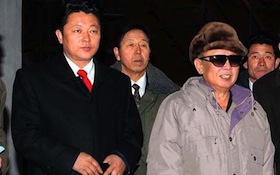U.S. Expands Sanctions Against North Korea
August 31, 2010
Featured Image
Obama Expands Sanctions Against North Korea - Associated Press
- The Obama administration on Monday widened the scope of U.S. financial penalties against North Korea, escalating pressure on the Pyongyang regime to give up its nuclear weapons.
- Targeted entities include one variously known as Office 39 or Bureau 39, believed to control organizations inside North Korea and abroad that raise money for senior North Korean leaders. The enigmatic office produces, smuggles and distributes narcotics, the Treasury Department said, and handles the import of luxury goods intended for Kim Jong Il, the top leader.
- Stuart Levey, the Treasury Department's undersecretary for terrorism and financial intelligence, told reporters that additional U.S. sanctions would be announced in the weeks ahead.
- "The destructive course the North Korean government is charting is facilitated by a lifeline" of illicit activities, Levey told reporters. "The North Korean government helps maintain its authority by placating privileged elites with money and perks such as luxury goods like jewelry, luxury cars and yachts."
North Korean Pair Viewed as Key to Secret Arms Trade - Wall Street Journal [link]
- A North Korean arms chief and Pyongyang's former ambassador to the United Nation's nuclear agency have emerged as key figures in an intensifying international effort to curb North Korea's weapons-trading activities.
- The global dealings of the two men, Chun Byung-ho and Yun Ho-jin, whom North Korea analysts believe to be related through marriage, date back to the 1980s. They have played leading roles in North Korea's development and testing of atomic weapons, according to current and former U.S. officials, Asian intelligence analysts and U.N. nonproliferation staffers.
- More troubling to officials, Messrs. Chun and Yun also oversee Pyongyang's vast arms-trading network, which appears to be spreading. They have shipped components for long-range missiles, nuclear reactors and conventional arms to countries including Iran, Syria and Myanmar.
- Chun and Yun's decades of experience in the weapons trade pose a challenge to an international community keen to disrupt Pyongyang's proliferation activities, say U.S. and Asian officials. "There is no reason to assume that Chun and Yun won't sell nuclear weapons," says David Asher, a former Bush administration official who has tracked Pyongyang's arms trade for a decade.
- "There needs to be an active effort to disrupt their WMD networks and drive them out of business now, before it's too late."
Indian Nuclear Bill Wins Final Approval - AFP [link]
- A bill aimed at throwing open India's 150-billion-dollar civilian nuclear market cleared its final parliamentary hurdle Monday after a stormy debate.
- The bill, critical to implementing a 2008 landmark atomic energy pact with the United States, which grants India access to foreign nuclear technology, was approved by parliament's upper house.
- The bill, which will be signed into law by India's president before a visit by President Barack Obama in November, also sets out liability in event of a nuclear accident.
- It was intended to satisfy private suppliers such as US-based General Electric and Westinghouse Electric, a unit of Japan's Toshiba Corp., which had been reluctant to invest without a legal framework setting out their liability.
Iran sets 2020 target for nuclear fusion reactor - Associated Press
- Iran says it has set a 2020 target date to build its first experimental nuclear fusion reactor, a feat that has yet to be achieved by any nation.
- Nuclear fusion, the process powering the sun and stars, has so far only been mastered as a weapon, producing the thermonuclear explosions of hydrogen bombs. It has never been harnessed for power generation.
- Tehran is not known to have carried out anything but basic fusion research.
A View from the Dark Side
New START treaty is dangerously flawed - Dan Ziegler of Heritage in The Cleveland Plain Dealer [link]
- In a letter to the editor Friday, a writer declared partisan politics was the reason why Republicans like Sen. George Voinovich have not offered their support for the New START treaty with Russia.
- While not surprising, this attack is unfortunate. Proponents intentionally are avoiding a real debate on this dangerously flawed treaty.
- Sen. Voinovich has not rushed to judge this treaty. Now, he should listen to the 41,000 Americans, including 3,000 Ohioans, who have voiced their opposition to this treaty at the Heritage Action for America website.



